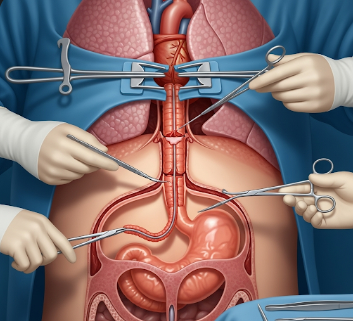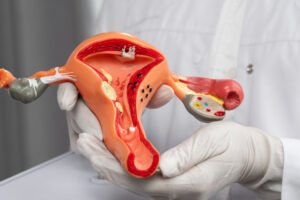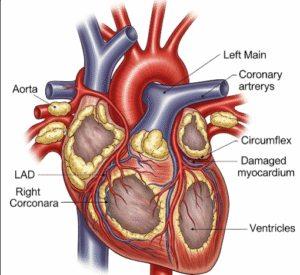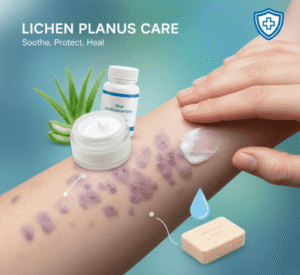Overview
Esophagectomy is a major surgical procedure that involves removing all or part of the esophagus to treat conditions such as esophageal cancer, severe dysplasia, or esophageal injury. The goal of the surgery is to remove diseased tissue, restore the continuity of the digestive tract, and improve long-term survival.
In South Korea, esophagectomy is performed in highly specialized thoracic surgery centers, using advanced minimally invasive techniques, robotic-assisted surgery, and comprehensive perioperative care to ensure optimal outcomes and faster recovery.
What is Esophagectomy?
Esophagectomy involves surgically removing part or all of the esophagus and reconstructing the digestive tract, usually using a portion of the stomach or intestine to restore continuity.
Types of Esophagectomy:
- Transhiatal Esophagectomy: Removal through abdominal and neck incisions without opening the chest
- Transthoracic Esophagectomy (Ivor Lewis): Removal through abdominal and chest incisions
- Minimally Invasive Esophagectomy (MIE): Using laparoscopic or robotic techniques to reduce trauma
- Endoscopic Submucosal Resection (for early-stage cancer): Less invasive removal of diseased esophageal tissue
Purpose:
- Remove malignant tumors or severely damaged esophageal tissue
- Restore normal digestive tract function
- Improve survival and quality of life for esophageal cancer patients
What are the Benefits?
Esophagectomy provides several critical therapeutic benefits:
✔ Removes malignant or diseased tissue to prevent cancer progression.
✔ Restores digestive continuity for oral nutrition.
✔ Relieves symptoms such as dysphagia, severe reflux, or pain.
✔ Reduces risk of life-threatening complications from untreated esophageal disease.
✔ Offers potential for long-term survival and improved quality of life.
Procedure Details
1) How should I prepare for Esophagectomy?
- Preoperative evaluation: Imaging (CT, PET, MRI), endoscopy, biopsy, and pulmonary/cardiac assessment
- Medical optimization: Address comorbidities such as diabetes, hypertension, or lung disease
- Nutritional support: Ensure adequate nutrition before surgery, sometimes via feeding tube
- Consent and counseling: Detailed discussion of procedure, risks, alternatives, and recovery
- Prehabilitation: Breathing exercises and physical conditioning may be recommended
South Korean thoracic centers provide personalized preoperative planning, nutrition support, and patient education to enhance surgical safety.
2) What happens during Esophagectomy?
- Anesthesia: General anesthesia with full airway management
- Surgical approach: Depending on type (transhiatal, transthoracic, minimally invasive)
- Esophageal removal: Diseased esophagus is excised
- Reconstruction: Stomach or intestinal segment is pulled up and connected to the remaining esophagus
- Closure: Incisions are sutured, and drains are placed if necessary
- Duration: Typically 4–8 hours, depending on complexity and surgical technique
Advanced Korean centers use robotic assistance, thoracoscopy, and laparoscopic tools to reduce surgical trauma, blood loss, and recovery time.
3) What happens after Esophagectomy?
- Immediate: Intensive monitoring in ICU for 1–2 days
- Hospital stay: Usually 7–14 days depending on recovery and complications
- Nutrition: Initially via feeding tube, gradually advancing to oral diet
- Rehabilitation: Breathing exercises, mobility training, and physical therapy
- Follow-up: Regular imaging and endoscopic evaluations to monitor for recurrence or complications
- Recovery: Full functional recovery may take several months, with ongoing nutritional support
Risks / Benefits
Potential Risks:
- ➤ Infection or pneumonia
- ➤ Bleeding or blood clots
- ➤ Anastomotic leak at reconstruction site
- ➤ Respiratory or cardiac complications
- ➤ Swallowing difficulties or nutritional challenges
- ➤ Nerve injury affecting voice or breathing
Major Benefits:
- ✔ Definitive treatment for esophageal cancer or severe disease
- ✔ Restores digestive continuity for nutrition
- ✔ Alleviates dysphagia and related symptoms
- ✔ Improves long-term survival and quality of life
- ✔ Minimally invasive options reduce surgical trauma and recovery time
Recovery and Outlook
- Immediate: ICU care with pain management, respiratory support, and monitoring
- 1–2 weeks: Gradual introduction of liquids and soft foods
- 4–6 weeks: Resume light activity and monitor nutritional intake
- 3–6 months: Most patients achieve improved swallowing and gradual return to normal diet
- Long-term: Regular follow-up for cancer surveillance and nutritional support
South Korean hospitals provide structured post-operative care, physical rehabilitation, dietary guidance, and long-term follow-up to ensure optimal outcomes.
When To Call the Doctor
Contact your doctor if you notice:
- ➤ Fever, chills, or signs of infection
- ➤ Severe chest or abdominal pain
- ➤ Persistent vomiting or difficulty swallowing
- ➤ Shortness of breath or coughing blood
- ➤ Leakage or swelling around surgical site
Best Korea Option / Process
South Korea offers world-class esophagectomy services due to:
- Expert thoracic and gastrointestinal surgeons with extensive experience
- Use of robotic and minimally invasive techniques
- High-quality perioperative and ICU care
- Structured pre- and post-operative rehabilitation programs
- Comprehensive nutritional support and cancer surveillance
- International patient assistance including consultation, scheduling, and follow-up
Top hospitals for Esophagectomy in Korea:
- Samsung Medical Center, Seoul – Thoracic Surgery & Cancer Center
- Asan Medical Center, Seoul – Advanced Esophageal Surgery
- Severance Hospital (Yonsei University Health System) – Thoracic and Upper GI Surgery
- Seoul National University Hospital – Thoracic Oncology & Surgery













